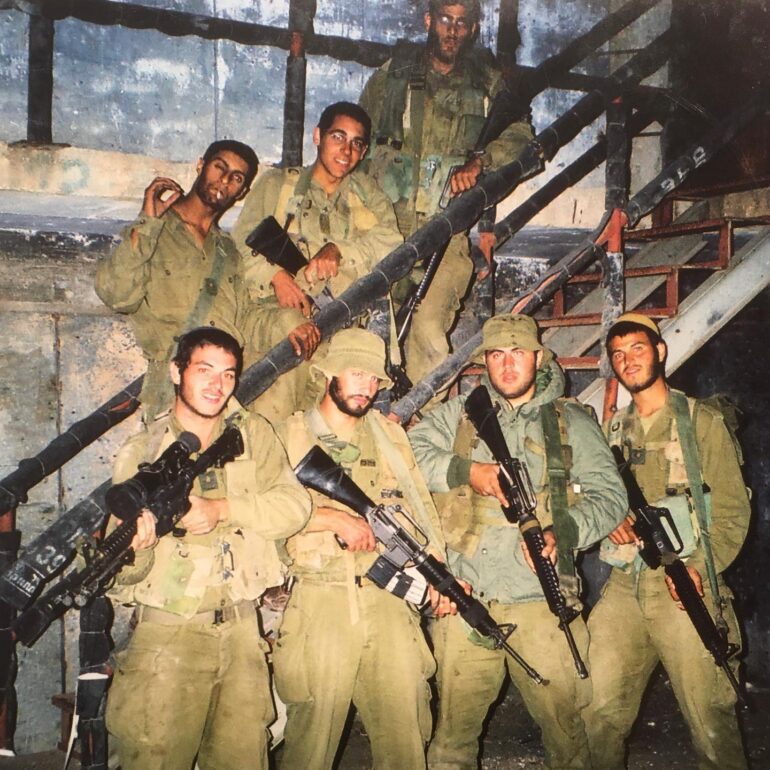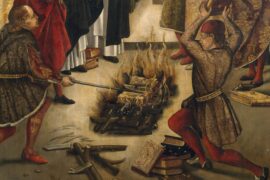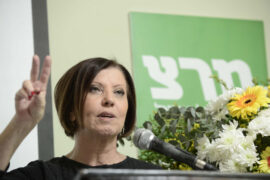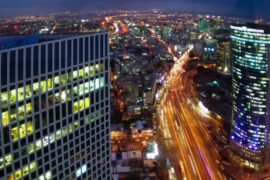Last week, I attended a reunion with the guys I served with in the Israeli army. I hadn’t seen them – certainly not altogether in one place – in at least 17 years.
I hadn’t actually planned to attend, being as the reunion was just after Tzom G’dalia and I was behind on work. But as I saw selfies posted in our WhatsApp group of old friends getting into cars to show they’re on the way from various corners of the country, I began to change my mind. The event was taking place at Esh Kodesh – a mountain village not far from my own. So with some supportive urging from my wife, I decided to head over and surprise the guys.
I’m really happy that I went. Not only because it was great to finally reconnect with a group of people I had gone through so much with during such a formative period of our lives. But also because laughing together with them and retelling old stories reminded me of a part of myself that I don’t always get to access today.
When I posted pictures from the reunion on social media, together with an old photo of us taken during our basic training to show how much we’ve aged, a Diaspora Jew highly critical of Israel – who knows that I share some of her criticisms of Israeli policies and colonial structures – asked what about this photo makes me proud. The following was my response to her (and perhaps to myself):
I only included this photo (which I discovered last night at the reunion) to contrast how we looked then versus now. I didn’t write anything about being proud or not proud but your question did inspire some introspection on my part so I want to thank you for that (always appreciate being pushed to reflect and challenge myself).
Taking into consideration my understanding of history and the conflict at the time, I am proud of myself.
I’m proud that I didn’t feel comfortable with the notion that just because I had been born in New York, I was expected to earn a college degree while Jews my age here in Israel were expected to engage in an armed conflict.
I’m proud of my younger self for not accepting that reality and for fully living his values by dropping out of school, making aliya and enlisting in a combat unit during the Second Intifada despite not even being able to speak or understand the Hebrew language.
It was a difficult time. Drive by shooting and cafe/bar/restaurant/bus bombings were an almost daily occurrence. I was personally present for some of these.
Like most of Israeli society, I wasn’t aware of what we were contributing to the conflict. I assume you’re familiar with the generic Israeli narrative and the role it ascribes to Palestinians (I still see that narrative as possessing much truth in regards to our people’s story but I’m obviously more aware today of what it omits). My understanding was that we were locked in an ethnic conflict with the Arab world and that the Palestinians were only the shock troops. I also saw the United States and European Union and United Nations and corporate media as hostile actors – not necessarily supportive of Palestinians but pushing their own agendas that limited Israeli independence and our ability to effectively defend ourselves. So I definitely experienced Israel as an underdog and given that context, I am proud of myself.
But I think what makes me most proud is the historical context – the fact that I merited to participate in the first Hebrew people’s army we’ve had in thousands of years. I have several criticisms for how our army is often used and the policies that drive it. But that doesn’t change the fact that it’s a mitzva de’oraita for a Jewish man to enlist and serve in Israel’s army at a time of conflict (even if that conflict is partially or largely our fault/responsibility).
The army was a difficult experience. We were sleep deprived and had nearly every detail of our lives controlled by a bureaucratic system and commanders 3-4 years younger than me and often far less experienced at life. And that’s without even getting into the physical challenges of the training or the violence we engaged in or the very real dangers we had to face. On top of all that, I entered basic training not being able to speak or understand Hebrew – which probably more than doubled the difficulty for me.
But I remember how I got myself through all that fatigue, frustration, stress and pain. I simply reminded myself that if Rashi or the Rambam or the Ramban or the Vilna Gaon or really any of our sages for the last 2,000 years had the opportunity to trade their greatness in Torah for a chance to wear the uniform of a Jewish army in an independent Hebrew state in Eretz Yisrael, they would do so in an instant.
The gratitude I felt at meriting to don that uniform would quickly eclipse all the difficulties (my politics were different back then so I didn’t struggle with the kind of internal conflicts I might be challenged with today).
So I’m also proud of myself for the level of will power I was able to muster and my ability to stay focused on the bigger picture and the significance of what I was doing within the context of Jewish history.





